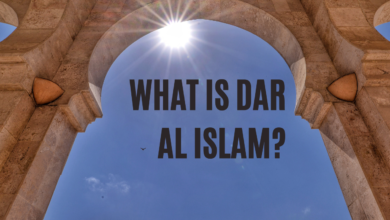
How do I get to Heaven in Islam?
Heaven, known as “Jannah” in Islam, is the ultimate paradise and the eternal abode of bliss and reward for righteous believers. It is a place of eternal happiness and closeness to Allah.

Introduction
Heaven, or “Jannah” in Arabic, is a central concept in Islam. It is the ultimate destination and the ultimate reward for devout Muslims who strive to live a righteous and pious life. The pursuit of Heaven is a fundamental aspect of Islamic faith, and achieving it requires faith, good deeds, and adherence to the teachings of the Quran and the Hadith. In this article, we will explore how one can attain Heaven in Islam.
Faith and Belief
The foundation of attaining Heaven in Islam is unwavering faith and belief in the oneness of Allah (God). Believing in the Shahada, the Islamic declaration of faith, is essential. The Shahada states, “La ilaha illallah, Muhammadur rasulullah,” which translates to “There is no god but Allah, and Muhammad is the messenger of Allah.” This declaration of faith is the cornerstone of Islam and the first step towards securing a place in Heaven.
Also check.
- What is Haram?
- Who is the Current Caliph of Islam?
- Islam
- When was Islam Founded?
- Where did Islam Originate?
Righteous Deeds
While faith is essential, it must be accompanied by righteous deeds. Muslims are taught to do good deeds and avoid sin. The Quran emphasizes the importance of good actions, stating that these deeds are weighed on the Day of Judgment to determine one’s fate.
Good deeds in Islam encompass a wide range of actions, including acts of worship such as prayer, fasting, and giving to charity (Zakat). Additionally, being honest, kind, and just in one’s interactions with others is highly valued. Acts of compassion and mercy are also considered virtuous.
Prayers and Worship
One of the most crucial aspects of Islamic practice is the performance of the five daily prayers. These prayers connect believers with Allah and serve as a means of seeking forgiveness for sins and guidance to the righteous path. Engaging in regular prayer is seen as a way to demonstrate one’s submission to Allah and seek His mercy and favor.
Fasting during Ramadan
Fasting during the holy month of Ramadan is another way to purify the soul and draw closer to Allah. Muslims fast from dawn until sunset, refraining from food, drink, and sinful behavior during this period. The fast is not just a physical act but a spiritual journey, allowing Muslims to reflect on their faith and the teachings of the Quran.
Giving to Charity (Zakat)
Zakat is a form of almsgiving in Islam, and it is obligatory for financially capable Muslims to donate a portion of their wealth to those in need. This act of charity demonstrates a willingness to share one’s blessings and support those who are less fortunate, which is a fundamental value in Islam.
Avoiding Sin and Repentance
Muslims are encouraged to avoid sinful behavior and seek repentance when they err. Repentance, or “Tawbah,” is the act of turning back to Allah and seeking His forgiveness. The Quran is filled with verses about Allah’s mercy and willingness to forgive those who sincerely repent.
Following the Sunnah
In addition to following the Quran, Muslims are encouraged to adhere to the teachings and actions of the Prophet Muhammad (peace be upon him). The Sunnah, which includes the Hadith (sayings and actions of the Prophet), provides a practical guide for how to live a righteous and pious life.
Trusting Allah’s Plan
Muslims are taught to trust Allah’s plan and to accept the trials and challenges that come their way with patience and gratitude. It is believed that enduring difficulties with patience and faith can lead to the purification of one’s soul and an increase in spiritual reward.
Conclusion
Attaining Heaven in Islam is a spiritual journey that requires unwavering faith, righteous deeds, and a commitment to living a life in accordance with the teachings of the Quran and the Sunnah. The path to Heaven is one of devotion, compassion, and continuous self-improvement. It is a pursuit of eternal bliss and closeness to Allah, which is the ultimate goal for every devout Muslim. By following these guidelines and seeking Allah’s mercy and forgiveness, one can hope to attain the highest reward in the afterlife, where Heaven awaits.

FAQs
What is Heaven (Jannah) in Islam?
Heaven, known as “Jannah” in Islam, is the ultimate paradise and the eternal abode of bliss and reward for righteous believers. It is a place of eternal happiness and closeness to Allah.
How can I attain Heaven in Islam?
Attaining Heaven in Islam requires a strong belief in the oneness of Allah, righteous deeds, following the teachings of the Quran and Sunnah, and seeking Allah’s mercy and forgiveness.
Is faith alone sufficient to enter Heaven in Islam?
While faith is fundamental, righteous deeds and a life in accordance with Islamic teachings are equally important. Faith and deeds go hand in hand in determining one’s place in Heaven.
What are some righteous deeds that can help me reach Heaven?
Righteous deeds include prayer, fasting, giving to charity (Zakat), being honest, kind, and just, and avoiding sinful behavior.
What is the significance of prayer in attaining Heaven in Islam?
Prayer is a fundamental aspect of Islamic faith and is seen as a means of seeking forgiveness, guidance, and connecting with Allah. Regular prayer is a demonstration of one’s submission to Allah.
Why is fasting during Ramadan important in the path to Heaven?
Fasting during Ramadan is a means of purifying the soul, increasing self-discipline, and drawing closer to Allah. It is a time for reflection and spiritual growth.
How does giving to charity (Zakat) contribute to attaining Heaven in Islam?
Giving to charity demonstrates a willingness to share one’s blessings with those in need. It is an act of compassion and generosity, which are highly valued in Islam.
What role does repentance play in the journey to Heaven?
Repentance, or “Tawbah,” is the act of turning back to Allah and seeking His forgiveness. It is a way to cleanse one’s soul and receive Allah’s mercy and pardon.
Why is following the Sunnah important in Islam?
The Sunnah, which includes the Hadith (sayings and actions of the Prophet Muhammad), provides practical guidance on how to live a righteous and pious life. Following the Sunnah is an integral part of Islamic practice.
Is trust in Allah’s plan and patience during challenges essential for reaching Heaven in Islam?
Yes, trusting Allah’s plan and enduring challenges with patience and gratitude are important aspects of the journey to Heaven. They contribute to the purification of the soul and spiritual reward.



